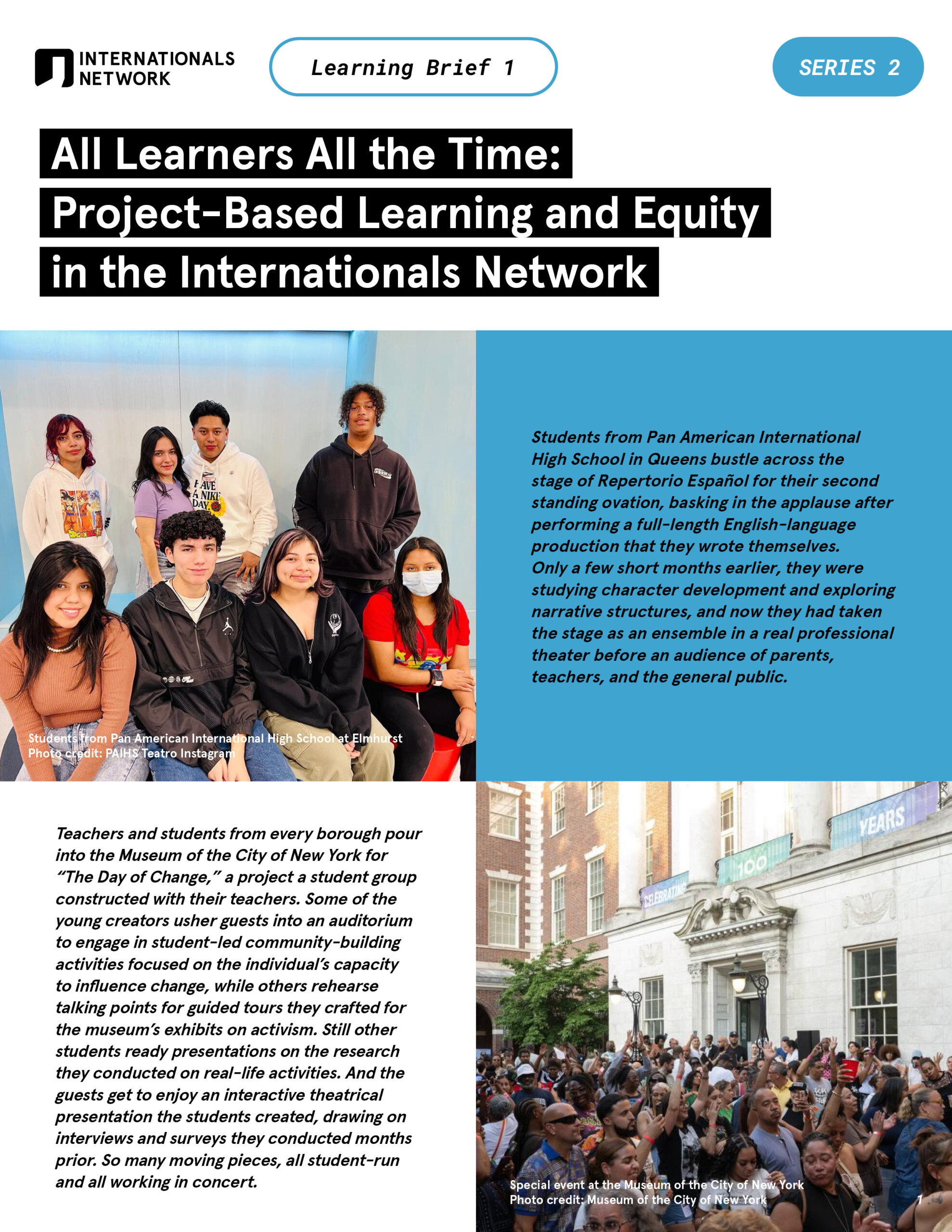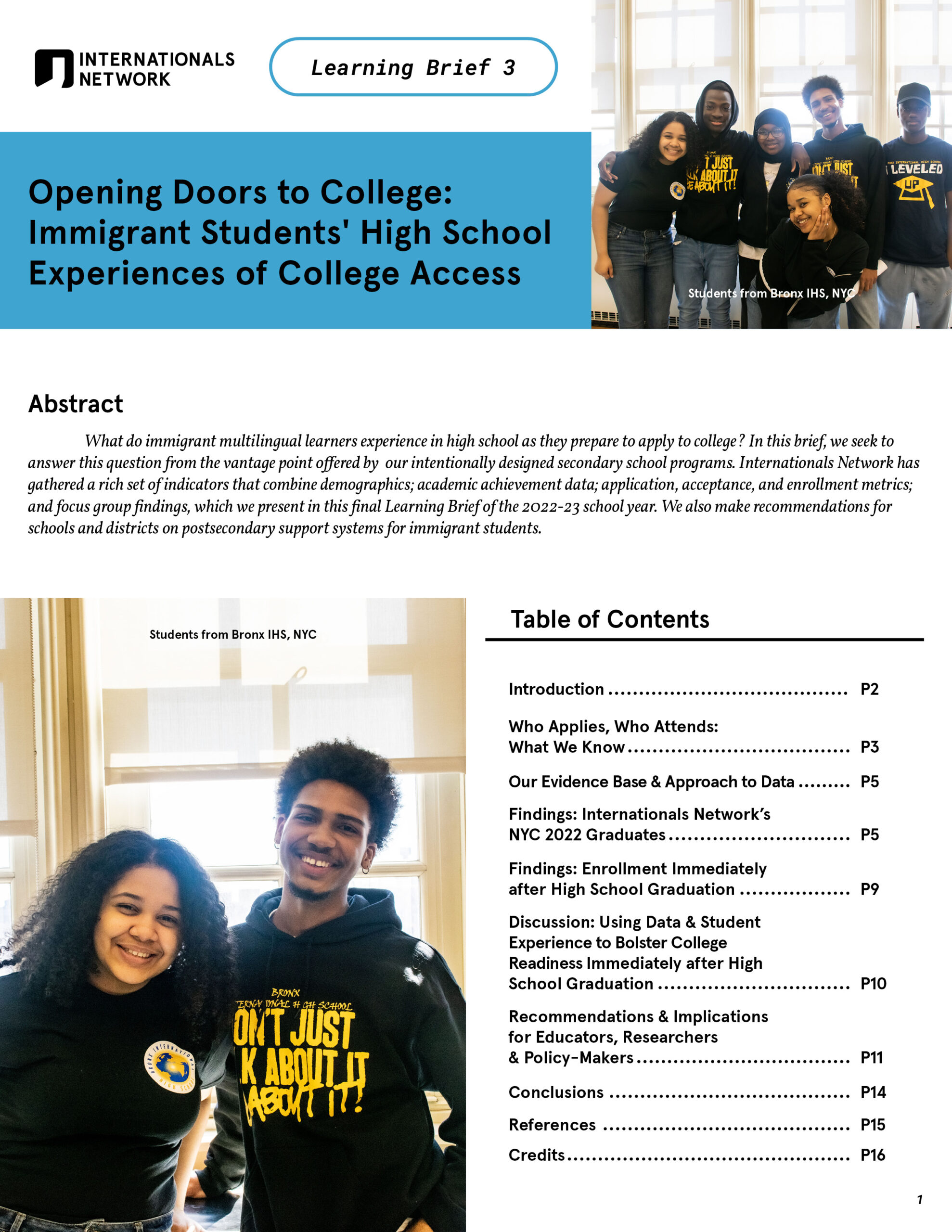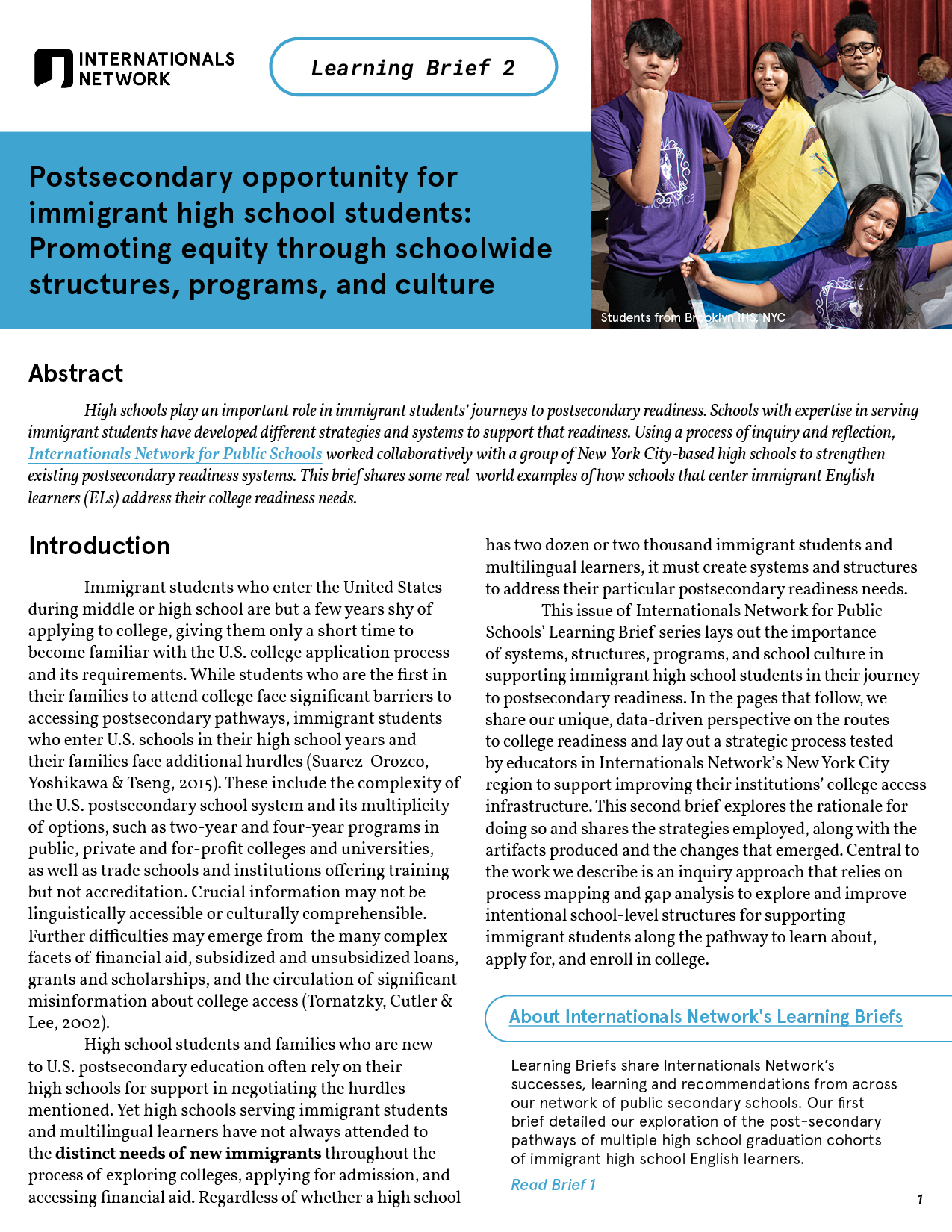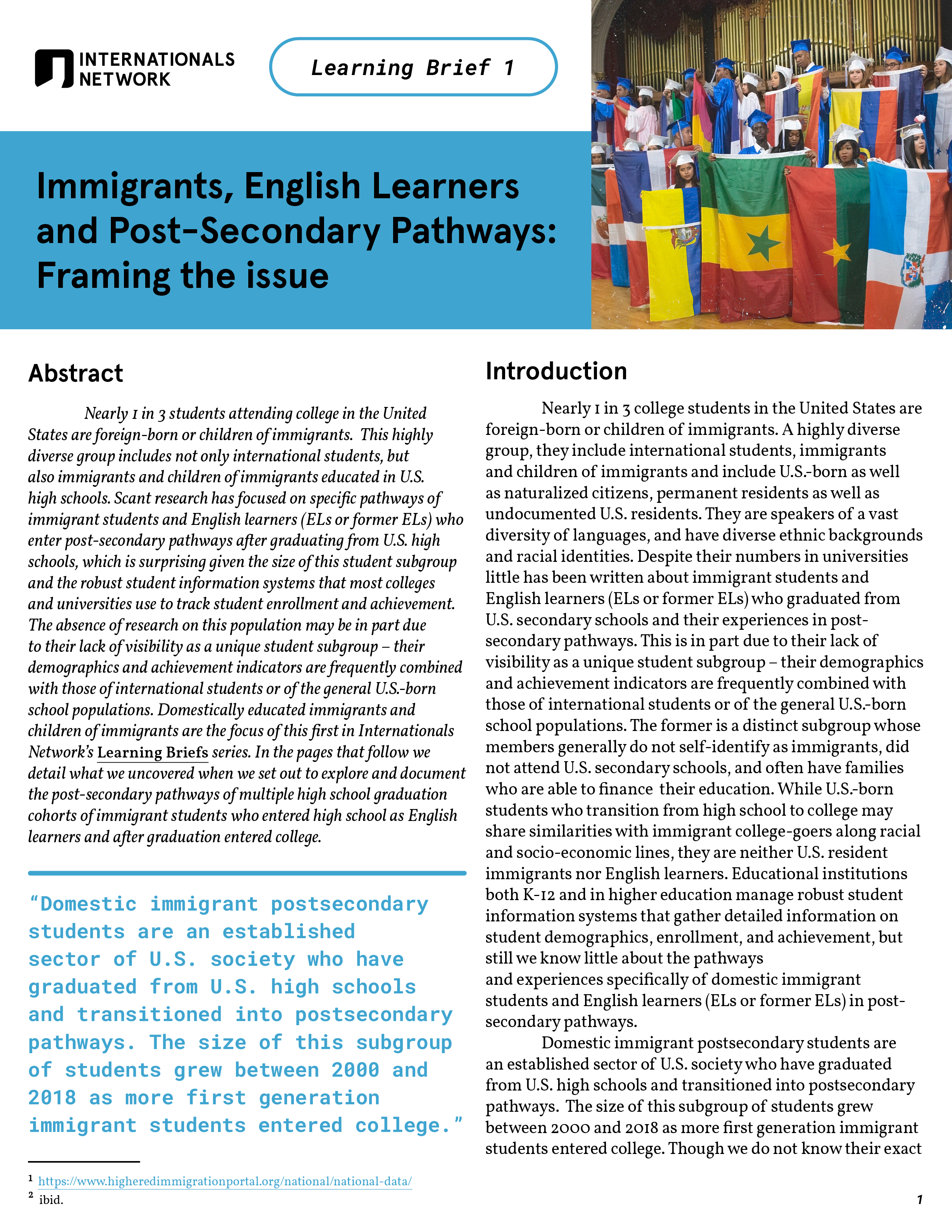Internationals Network transforms education for immigrant and refugee multilingual learners by partnering with schools and districts to better serve those students. We design new schools and programs within existing schools, coach leaders, teachers, and school staff, and provide access to an invaluable network of support and learning for those who work with us. Internationals Network remains the only school development and support organization specifically addressing the educational needs of the multilingual learner immigrant and refugee population.
Our comprehensive approach works. As leaders, teachers, and school staff tailor their instruction, culture, school structures, and leadership to effectively serve this population, the students are far more successful than their counterparts outside of our network—graduating at much higher rates.
VISION & MISSION
Internationals Network’s vision is to ensure that all recent immigrant students who are multilingual learners have access to a quality education that prepares them for college, career and beyond. Our mission is to provide quality public education for recently arrived immigrants by growing and sustaining a strong national network of innovative public schools, while sharing proven best practices and influencing policy for multilingual learners on a national scale.
WHAT WE DO
Internationals Network designs, develops, and supports schools and programs for recently-arrived immigrants and refugees. Our workshops, coaching, conferences, institutes and other professional development offerings are designed to simulate the very core principles we advocate for in classrooms and schools. Based on the work of innovative practitioners, Internationals Network’s services are engineered to provide hands-on, experiential exploration and inquiry, to model meaningful collaborative structures and routines, to meet the needs and uphold the assets of a heterogeneous array of practitioners, to demonstrate the intertwined rhythm of well-scaffolded activities and materials, and to center the learning, growth, and curiosity of all participants in our shared pursuit of transforming education for multilingual learners.
Since its inception in 2004, Internationals Network has partnered with school districts and community organizations to design and implement schools and academies that serve recent immigrant and refugee multilingual learners. To date, Internationals has partnered with 12 school districts across the country resulting in the opening of 30 new schools or academies, and is still growing! Internationals continues to explore opportunities to partner with school districts looking to improve the education and outcomes of their multilingual learners.
Internationals has deepened its work in three hubs: NYC, the California Bay Area and the DC Metro area, and other locations across the country by providing professional development and support at the district, school leader, teacher, and network level. In addition, Internationals provides support to its network through school-based and network partnerships with citywide and community-based organizations.
The Internationals Network’s unique and acclaimed approach to professional development eschews lectures, hierarchies, and traditional facilitator-focused models, and instead embodies the creative, collaborative, and equity-driven spirit of the school communities we serve. For many participants, the experience of Internationals Network’s professional development is unlike any they have encountered previously. By bridging conceptual frameworks with concrete, immediately applicable strategies and resources, Internationals Network’s professional development uniquely prepares participants to partner with one another and with the students and families they serve.
New School Development
Since its inception in 2004, Internationals Network has partnered with school districts and community organizations to design and implement schools and academies that serve recent immigrant and refugee multilingual learners. To date, Internationals has partnered with 12 school districts across the country resulting in the opening of 28 new schools or academies, and is still growing! Internationals continues to explore opportunities to partner with school districts looking to improve the education and outcomes of their multilingual learners.
School Support
Internationals has deepened its work in three hubs: NYC, the California Bay Area and the DC Metro area, and other locations across the country by providing professional development and support at the district, school leader, teacher, and network level. In addition, Internationals provides support to its network through school-based and network partnerships with citywide and community-based organizations.
Professional Development
The Internationals Network’s unique and acclaimed approach to professional development eschews lectures, hierarchies, and traditional facilitator-focused models, and instead embodies the creative, collaborative, and equity-driven spirit of the school communities we serve. For many participants, the experience of Internationals Network’s professional development is unlike any they have encountered previously. By bridging conceptual frameworks with concrete, immediately applicable strategies and resources, Internationals Network’s professional development uniquely prepares participants to partner with one another and with the students and families they serve.
OUR IMPACT
Internationals Network seeks to graduate students who are well-prepared to embark upon successful postsecondary pathways. Success includes achievement metrics and tangible student experiences. In addition to high achievement rates, all across the schools and academies in Internationals Network, students report high levels of belonging, a feeling of being part of a community, and feeling like they matter as learners and individuals. They express being “part of a global community” and valuing their relationships with their peers and teachers.
Student Success
Across Internationals Network schools and academies, students graduate at rates that exceed the national average for students who enter school classified as English language learners. Over 10,000 immigrant youth have completed their high school diploma in Internationals Network schools.
Internationals Network seeks to prepare students to graduate high school and succeed on post-secondary pathways. For any group of multilingual learners who enter Internationals Network schools, more graduate high school than their peers across the US by 4% points on average. Of those graduates, more Internationals Network graduates enroll in college than their peers by more than 12% and they stay, succeed and complete college at rates above their peers who also attend low-income, high-minority schools. Internationals Network graduates compete in high school graduation, college enrollment and degree completion with a comparable set of peers across the US.
Educator Professional Development
Internationals Network provides ongoing support and opportunities for networked learning to over 1,000 school staff across the US. We support Internationals leaders, teachers, and student support staff through a range of professional development and coaching supports. We are a learning community of practitioners. All schools, leaders, teachers, and staff in the Internationals Network learn from each other.
Each school year, Internationals Network delivers more than 1,100 professional development services to more than 950 individual educators. This includes major national events like our Annual Professional Development conference that brings together more than 500 educators from more than 12 school districts across 10 states.
Internationals Network leaders and educators rely on Internationals professional development and community of practice to improve and sustain successful practices in their schools. After participating in Internationals’ professional development 93% of school leaders, teachers, and staff reported feeling more prepared to meet the needs of multilingual learners.
Educators
Internationals Network provides ongoing support and opportunities for networked learning to over 1,000 school staff across the US. We support Internationals leaders, teachers, and student support staff through a range of professional development and coaching supports. We are a learning community of practitioners. All schools, leaders, teachers, and staff in the Internationals Network learn from each other.
Each school year, Internationals Network delivers more than 1,100 professional development services to more than 950 individual educators. This includes major national events like our Annual Professional Development conference that brings together more than 500 educators from more than 12 school districts across 10 states.
Internationals Network leaders and educators rely on Internationals professional development and community of practice to improve and sustain successful practices in their schools. After participating in Internationals’ professional development 93% of school leaders, teachers, and staff reported feeling more prepared to meet the needs of multilingual learners.
New School Development
This site is protected by reCAPTCHA and the Google Privacy Policy and Terms of Service apply.
Professional Development
This site is protected by reCAPTCHA and the Google Privacy Policy and Terms of Service apply.
Other inquiries: info@internationalsnetwork.org
OUR PUBLICATIONS
LEARNING BRIEFS
Learning Briefs share Internationals Network’s successes, learning and recommendations from across our network of public secondary schools.
Learning Briefs — Series 2: Project-based Learning
What does it mean to implement project-based learning with adolescents who must adjust to U.S. schools as they learn English?
Click the link to discover insights and strategies in our comprehensive brief.
Learning Briefs — Series 1: College Access
OUR REPORTS
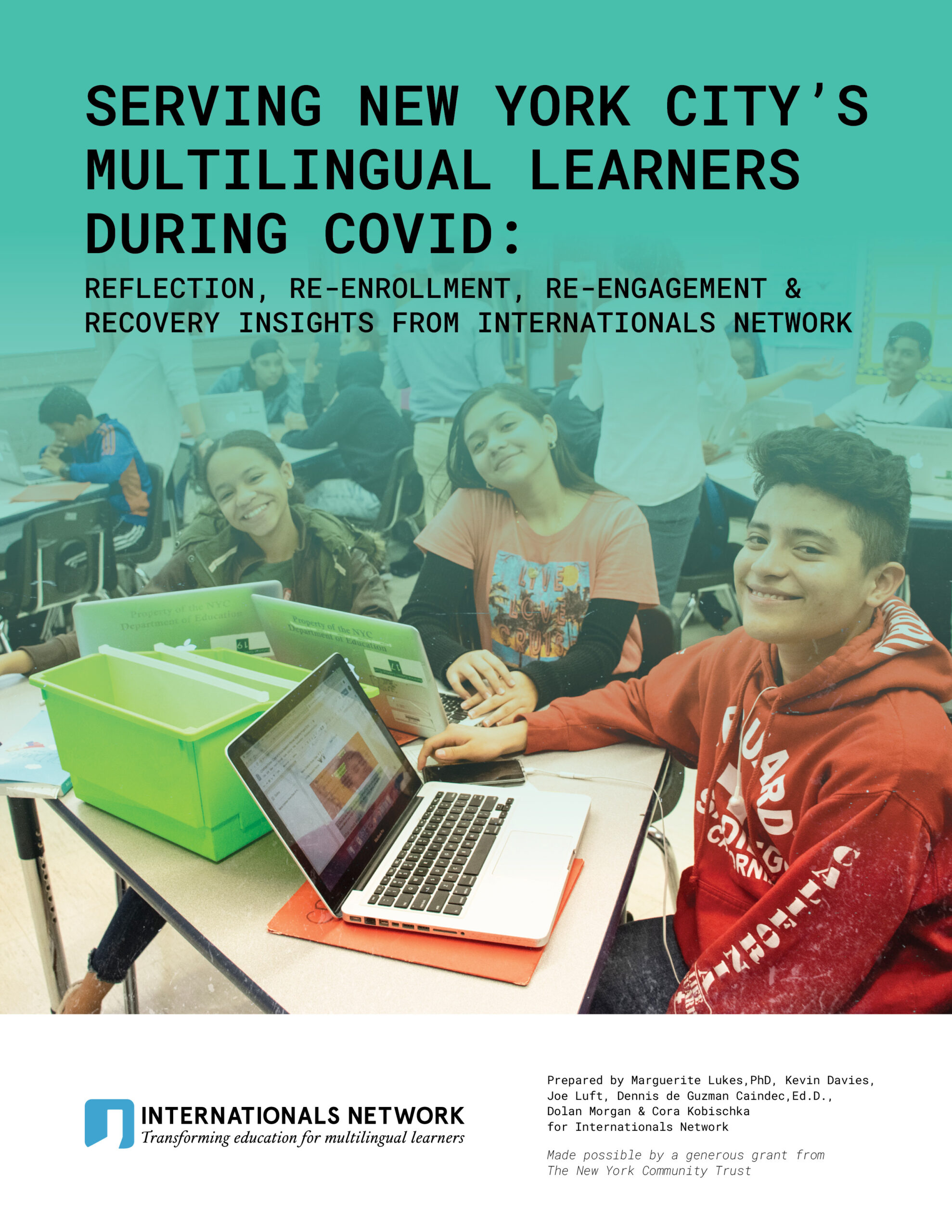
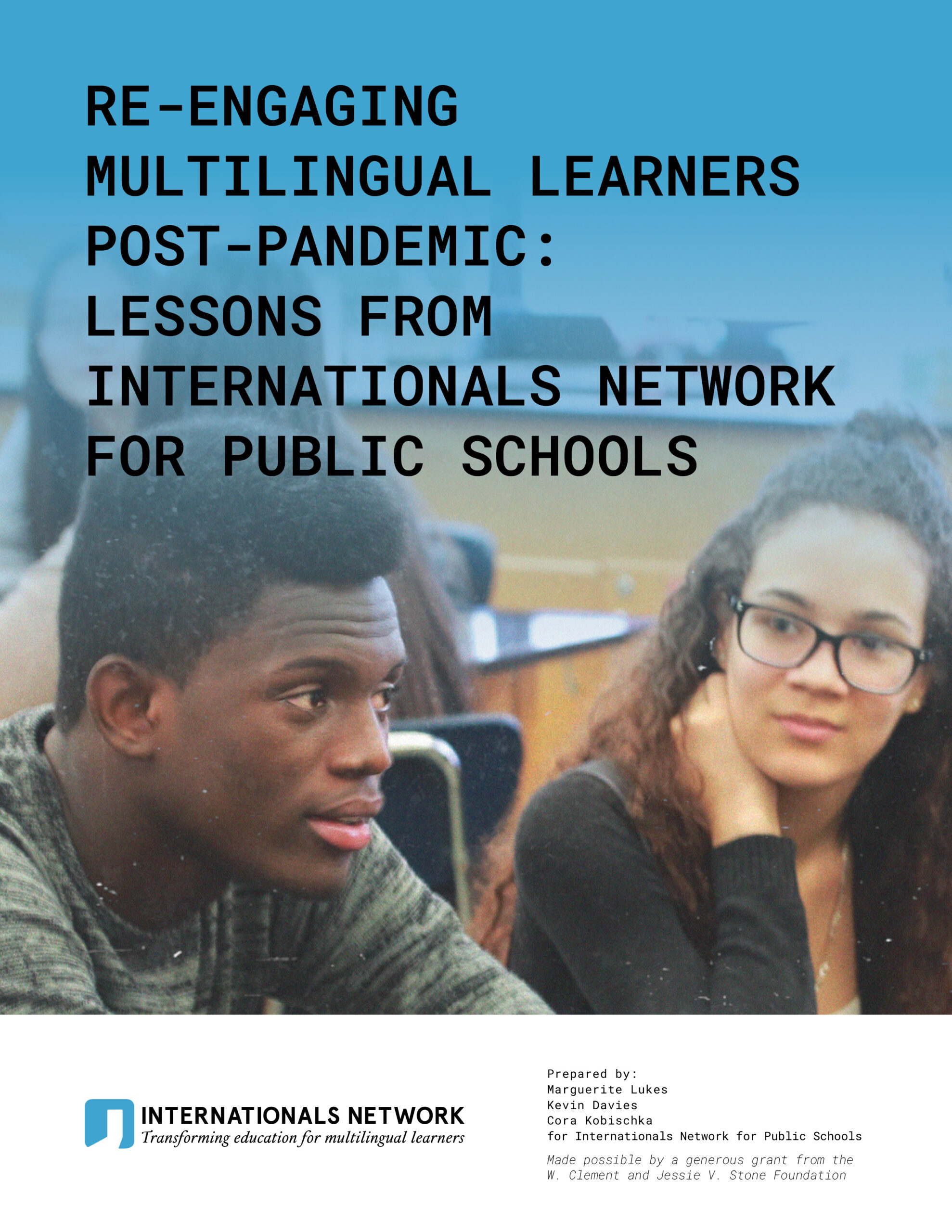
RESEARCH
Many scholars and policy analysts have examined the success of Internationals Network schools and published a variety of reports and peer-reviewed articles to highlight the Network’s effectiveness. In this section are some of our most recent publications.
Find even more here.
Leveraging Nuanced Data to Inform Research and Policy for Immigrant Students and Families
More than a quarter of US children have at least one immigrant parent, but researchers and policymakers often do not have adequate data on these children’s experiences in school. Information on the languages students speak at home can provide perspective on students’ experiences and takes communities’ unique strengths and challenges into account. States must report data on languages spoken at home to the federal government each year, yet district-level data are rarely published.
Home language data have untapped value, with far-reaching implications for instruction, student support services, and policy. Better and more public data on student background can enhance our understanding of students’ experiences and provide nuanced information to educators, researchers, and policymakers to better serve distinct student subgroups. Publishing district-level home language data could inform education policy decisions, providing much-needed nuance to public education data systems.
Internationals Network for Public Schools A Deeper Learning Approach to Supporting English Learners
READ THE REPORT
This report highlights how Internationals has re-created, sustained, and spread its complex and equity-oriented model across the country, even in the face of the challenges that arise when seeking to create substantive changes to teaching and learning. The report begins with a description of the Internationals approach and how it designs schools and academies with structures—such as mixed-age classes, teaching looping, interdisciplinary team collaboration, and advisories—to bring its vision and commitments to life. In addition, it identifies the systems and structures that have enabled Internationals to re-create its model in a high-quality manner.
The Internationals Network for Public Schools: Educating Our English Learners Well
The Internationals model greatly increases the number of recent immigrant ELs who stay in high school, graduate, and attend and complete college. What is the secret to the Internationals’ success? How do they organize instruction, develop the curriculum, support language learning, and develop teachers? How do they create bridges for recent immigrants to their new society and to their futures? And how have the schools been able to replicate success from one school to the next? This study examines Internationals’ instruction, assessment, professional learning, and governance practices that contribute to student success.
Long-Term English Learners: Current Research Policy and Practice
English learners (ELs) are one of the fastest growing populations in PK–12 environments and as a subgroup, long‐term English learners (LTELs) form one subgroup that provokes particular concern. The authors present possible interventions for LTELs, including the Internationals Network as a large‐scale intervention model, followed by smaller scale interventions made on behalf of LTELs in existing schools. The article concludes with strategies and suggestions toward better outcomes for LTELs in school, with Internationals Network shown as a best practice.
Leading in the Context of Immigration: Cultivating Collective Responsibility for Recently Arrived Immigrant Students.
Although school based discourses often frame immigrant students as in need of intervention, leaders can challenge this exclusionary logic, encouraging educators to help students develop linguistic and academic skills while affirming students’ rich transnational experiences. This article provides a glimpse into the effective approach used by Internationals Network schools in serving recently arrived immigrant youth, with an emphasis on dimensions of leadership that engender collective responsibility for immigrant youth as well as structures and practices that empower teachers to develop rigorous and responsive curriculum and to support students varied needs.
Internationals Network for Public Schools A Deeper Learning Approach to Supporting English Learners
READ THE REPORT
This report highlights how Internationals has re-created, sustained, and spread its complex and equity-oriented model across the country, even in the face of the challenges that arise when seeking to create substantive changes to teaching and learning. The report begins with a description of the Internationals approach and how it designs schools and academies with structures—such as mixed-age classes, teaching looping, interdisciplinary team collaboration, and advisories—to bring its vision and commitments to life. In addition, it identifies the systems and structures that have enabled Internationals to re-create its model in a high-quality manner.
Deeper Learning: Opportunities and Outcomes
The Study of Deeper Learning: Opportunities and Outcomes examines how some schools have provided opportunities for students to acquire deeper learning skills and how these opportunities are related to student outcomes. The deeper learning theory of action assumes that opportunities to engage in deeper learning activities help students to develop three types of deeper learning competencies: cognitive (mastery of core content, critical thinking skills), interpersonal (collaboration skills, communication skills), and intrapersonal (learning-how-to-learn skills, academic mindsets).
THE INTERNATIONALS APPROACH
Internationals Network has developed a comprehensive approach to the education of immigrant and refugee youth that addresses the areas of a school’s structure, pedagogy, culture, and governance that effectively serve multilingual learners. The Internationals Approach, a set of 5 Core principles, is based on proven practice and research and provides school leaders, teachers, and staff with high leverage strategies that lead to better outcomes for students.
INTERNATIONALS 5 CORE PRINCIPLES

Heterogeneity + Collaboration
Schools and classrooms are heterogeneous and use collaborative structures that build on the strengths of each member of the school community to optimize learning.

Experiential Learning
Expansion of the 21st century schools beyond the four walls of the building motivates adolescents and enhances their capacity to successfully participate in modern society.

Language + Content Integration
Strong language skills develop most effectively in context and emerge most naturally in a purposeful, language rich, interdisciplinary, and experiential program.

Localized Autonomy + Responsibility
Linking autonomy and responsibility at every level within a learning community allows all members to contribute to their fullest potential.

One Learning Model
For All
All members of our school community work in diverse, collaborative groups using hands-on projects; put another way, the model for adult learning and student learning mirror each other.
